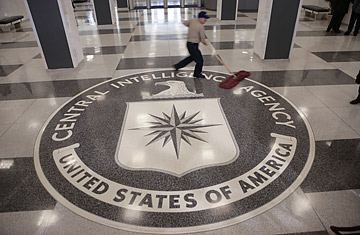
The logo of the U.S. Central Intelligence Agency is swept clean in the lobby of the CIA headquarters in Langley, Virginia.
On Sept. 11, declared the commission investigating the 9/11 attacks in its 567-page report, the "United States became a nation transformed." From the shipyards of Seattle to the conventioneer-stuffed ballrooms of Boston, the scramble to prepare for the possibility of another attack offered a panorama last week of the country's metamorphosis. Police divers in the Port of Seattle combed the hulls of cruise ships for explosive devices. The Secret Service ordered that all food deliveries to Boston's Fleet Center, site of the Democratic National Convention, be tested for radioactive material. In Hennepin County, Minn., 2,500 government employees did a simulated evacuation of their 24-story office building. (They got out in 43 min.) "Complacency is a commodity we can't have," says Al Bataglia, Minnesota's homeland-security chief. "We need to train like we would fight in the real event."
The authors of The 9/11 Commission Report hope they have sounded a call to battle. In official Washington, the arrival of the tome was greeted with a grim solemnity that reflected the panel's decision to apportion blame across dozens of agencies spanning two presidencies. Meticulous in its reconstruction of the attacks and unflinching in its conclusions about why the government failed to stop them, the report singles out the U.S.'s sprawling intelligence apparatus for an overhaul, hammering the nation's spooks for their inability to piece together Osama bin Laden's plot--and raising new doubts about whether they are better positioned to detect the next one. Timed for release just before the start of the election season, the report landed amid galloping anxieties among U.S. intelligence and law-enforcement agencies about the imminence of another terrorist attack. U.S. officials say reports from agents and "code talk" picked up from extremists' e-mail point to a possible al-Qaeda attack before the Nov. 2 election. A counterterrorism official tells TIME that a recent analysis of al-Qaeda's 2001 timeline shows that the hijackers started to gather in the U.S. 20 weeks before Sept. 11 and the entire strike team had infiltrated the country no later than 7 1/2 weeks before, leading some intelligence analysts to conclude that members of the operational cell must already be here. Says a CIA official: "We have some fairly specific information that al-Qaeda wants to come after us." The chairman of the 9/11 panel, Tom Kean, reiterated the sense of foreboding. "An attack of even greater magnitude is possible and even probable," he said. "We don't have the luxury of time."
